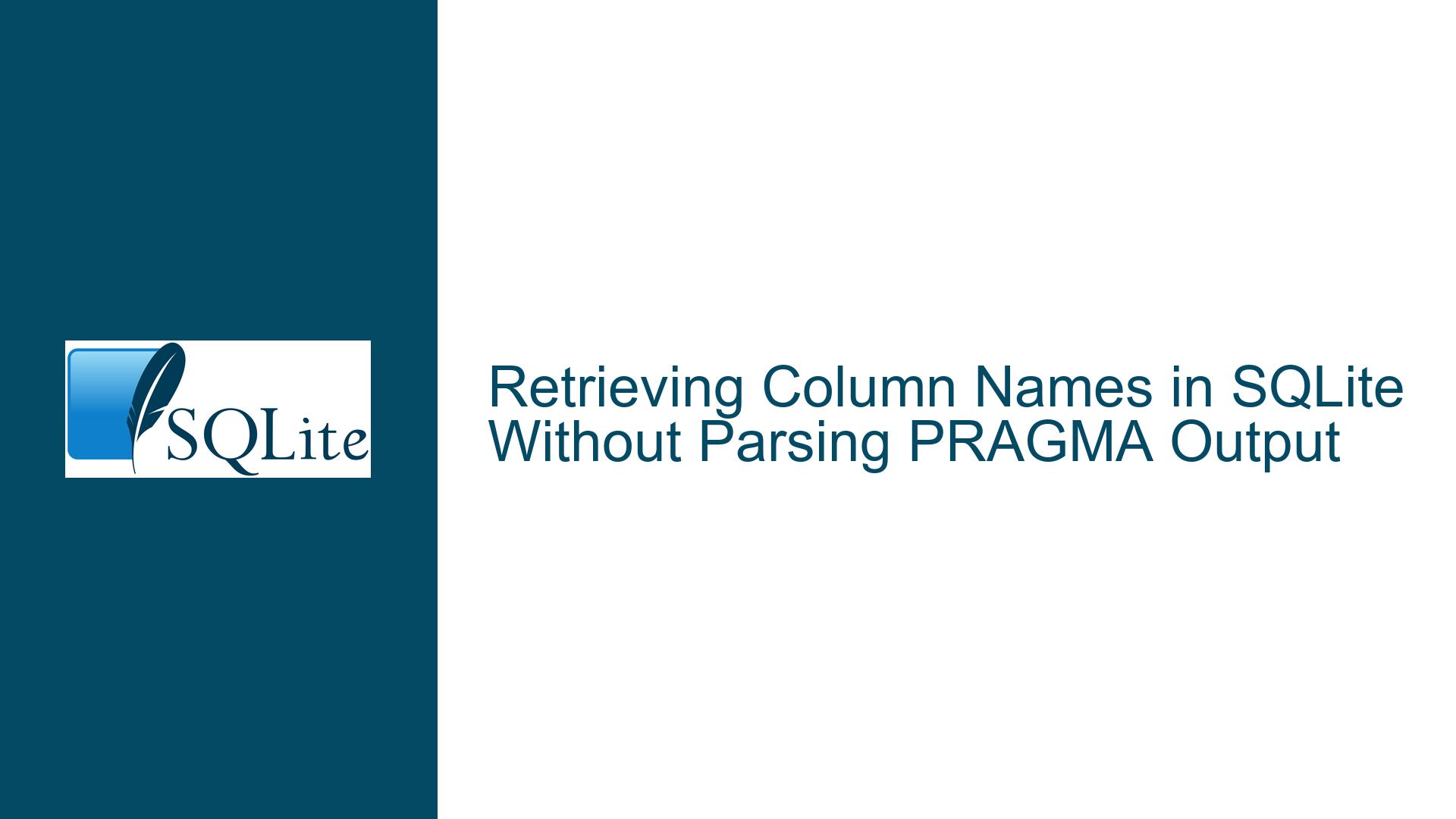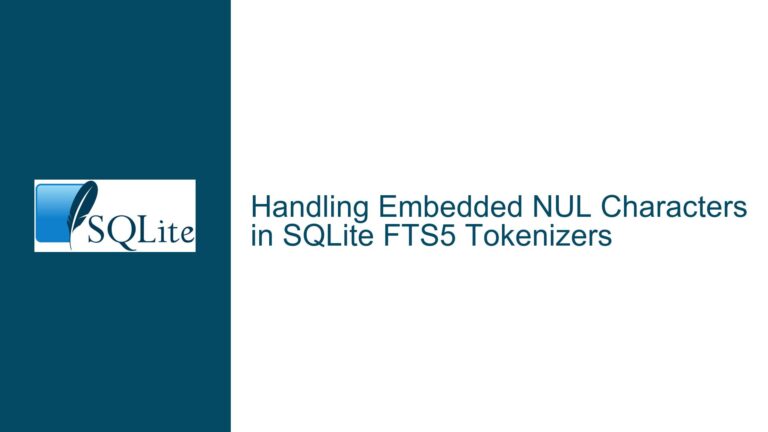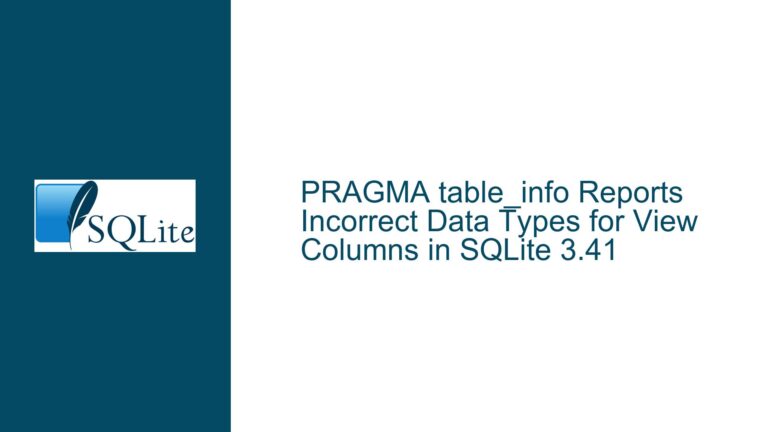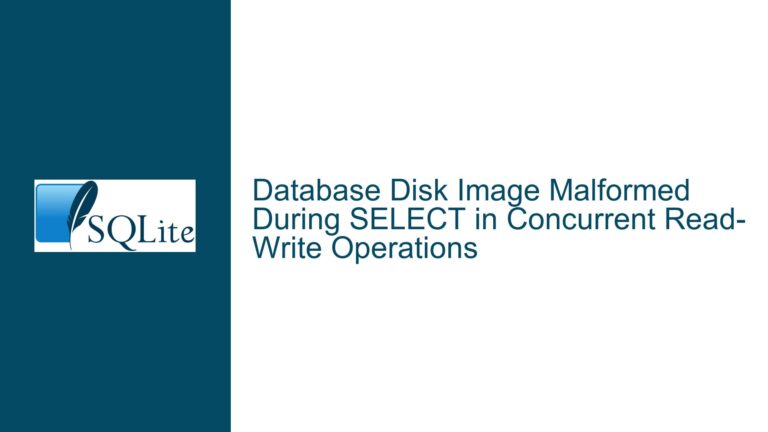Retrieving Column Names in SQLite Without Parsing PRAGMA Output
Understanding the Challenge of Extracting Column Names from SQLite Tables
SQLite provides several mechanisms to introspect database schema details, with the PRAGMA table_info command being a common starting point for developers. When executed, this command returns metadata about the columns of a specified table, including details such as column names, data types, constraints, default values, and whether a column is part of the primary key. For example, running PRAGMA table_info("stores") yields a result set with six fields: cid, name, type, notnull, dflt_value, and pk. The output includes technical details that are critical for schema analysis but may not be necessary when the goal is simply to retrieve column names.
The raw output from PRAGMA table_info is structured as a table with rows representing columns and columns representing attributes. In the example provided, the output includes entries such as 0|id|INTEGER|0||1, where the second field (id) is the column name. While this format is useful for comprehensive schema inspection, it requires parsing to isolate the column names. Parsing becomes a burden when integrating this information into scripts, applications, or tools that need to dynamically generate queries, validate input data, or automate schema migrations. The parsing step introduces additional complexity, especially when handling edge cases such as spaces in column names or varying output formats across SQLite versions. Developers often seek a direct method to obtain column names without intermediate processing, which would streamline workflows and reduce error-prone string manipulation.
The challenge is rooted in SQLite’s design philosophy, which emphasizes simplicity and flexibility. Unlike some database systems that offer dedicated functions or system tables for column name retrieval (e.g., INFORMATION_SCHEMA in MySQL), SQLite relies on pragmas and metadata queries that return detailed schema information. This design choice allows for lightweight operation but shifts the responsibility of data extraction to the user. Consequently, developers must either parse the output of PRAGMA table_info or find alternative methods to retrieve column names directly. The discussion highlights this tension between SQLite’s minimalist approach and the practical need for concise metadata access.
Why PRAGMA table_info Returns Excess Data and Alternative Approaches
The PRAGMA table_info command is designed to provide a complete overview of a table’s structure, catering to scenarios where detailed schema analysis is required. For instance, when debugging data type mismatches, verifying constraints, or generating documentation, the additional fields such as type, notnull, and pk are indispensable. However, this comprehensiveness becomes a drawback when only column names are needed. The inclusion of extraneous data forces developers to implement parsing logic, which can fail if the output format changes or if column names contain delimiter characters (e.g., |).
SQLite’s architecture offers alternative pathways to retrieve column names without parsing PRAGMA output. One such method involves querying the pragma_table_info table-valued function, which returns the same data as PRAGMA table_info but in a format that can be manipulated using standard SQL. This function enables developers to use SQL’s projection capabilities to select only the name field, thereby isolating column names. For example, SELECT name FROM pragma_table_info('stores') returns a result set with one column (name) and one row per column in the table. This approach eliminates the need for parsing by leveraging SQL’s native data retrieval mechanisms.
Another alternative is the use of SQLite’s C API, which provides programmatic access to result set metadata. Functions such as sqlite3_column_count(), sqlite3_column_name(), and sqlite3_column_type() allow developers to retrieve column names and other attributes after preparing a statement (e.g., SELECT * FROM stores). While this method is powerful for application development, it is not directly accessible from the SQLite command-line interface (CLI) or for ad-hoc queries. The CLI’s limitation of omitting column headers for empty result sets further complicates matters, as running SELECT * FROM stores with no rows would yield no column names. This constraint makes the CLI unsuitable for scenarios where tables might be empty but schema inspection is still required.
The discussion also reveals community-driven solutions, such as combining shell commands with text processing tools like awk to parse PRAGMA output. While effective in specific environments, these methods introduce dependencies on external tools and platform-specific syntax, reducing portability. The ideal solution balances simplicity, portability, and reliance on SQLite’s native capabilities.
Step-by-Step Methods to Retrieve Column Names Directly in SQLite
Method 1: Using pragma_table_info with SQL Projection
The pragma_table_info function allows SQL-like querying of table metadata. To retrieve only column names, execute:
SELECT name FROM pragma_table_info('stores');
This returns a list of column names, one per row. To concatenate the names into a single string separated by a delimiter (e.g., |), use the GROUP_CONCAT aggregate function:
SELECT GROUP_CONCAT(name, '|') FROM pragma_table_info('stores');
The GROUP_CONCAT approach is particularly useful for generating comma-separated lists (CSV) or other delimited formats required by external systems. Adjust the delimiter as needed.
Method 2: Querying Column Names via the C API
For programmatic access, use the SQLite C API to prepare a statement and iterate over its columns:
sqlite3 *db;
sqlite3_open("your_database.sqlite", &db);
sqlite3_stmt *stmt;
const char *sql = "SELECT * FROM stores";
sqlite3_prepare_v2(db, sql, -1, &stmt, NULL);
int column_count = sqlite3_column_count(stmt);
for (int i = 0; i < column_count; i++) {
printf("%s\n", sqlite3_column_name(stmt, i));
}
sqlite3_finalize(stmt);
sqlite3_close(db);
This method retrieves column names dynamically, even for empty tables, and integrates seamlessly into applications.
Method 3: Shell-Based Parsing with External Tools
When using the SQLite CLI, pipe PRAGMA output to a text processor like awk:
sqlite3 your_database.sqlite "PRAGMA table_info('stores')" | awk -F'|' '{print $2}'
For a delimited string:
sqlite3 your_database.sqlite "PRAGMA table_info('stores')" | awk -F'|' 'NR>1 {printf "%s|", $2} END {print ""}'
This approach is platform-dependent and requires familiarity with shell scripting but offers quick results in development environments.
Method 4: Leveraging Empty Temporary Tables
Create a temporary table with the same structure and use SELECT * to trigger column header output in the CLI:
CREATE TEMP TABLE tmp_stores AS SELECT * FROM stores LIMIT 0;
.headers on
SELECT * FROM tmp_stores;
This workaround exploits the CLI’s behavior of showing headers for non-empty result sets, though it requires write permissions.
Choosing the Right Method
- For ad-hoc queries: Use
SELECT GROUP_CONCAT(name, '|') FROM pragma_table_info('stores'). - In applications: Implement the C API approach for dynamic metadata retrieval.
- In shell scripts: Combine
PRAGMAwithawkor similar tools for rapid extraction. - For empty tables: Use temporary tables or ensure
GROUP_CONCATis applied topragma_table_info.
By understanding these methods, developers can efficiently retrieve column names in SQLite while avoiding unnecessary parsing and maintaining compatibility across environments.






